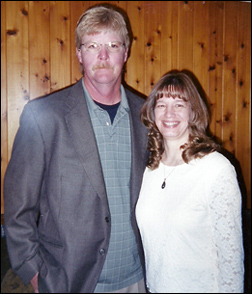Debra Quinn’s father, sister, aunt, grandmother and great aunt all passed away from ALS, and in 2009, she was diagnosed with ALS herself. This hereditary form of the disease is called familial ALS (fALS).
After the loss of her younger sister in 2007, Debra decided that she could no longer stay silent.Today, she is “the voice for my children, nieces, nephews and cousins, all of whom have a 50 percent chance of inheriting ALS.”A featured speaker at National ALS Advocacy Day in Washington, DC, Debra is also the spokesperson for Hearts for ALS NY and an active member of the The ALS Association’s Upstate New York Chapter.As a result of her tireless activities, she was recently awarded the New York State Senate Liberty Medal.
After learning about her remarkable story, we reached out to Debra to find out a little more about her.Here is our interview with the indomitable Debra Quinn, one of more than 7,100 PatientsLikeMe members with ALS.
1. How would you describe the impact of familial ALS on your family?
It has truly changed our lives. We always knew it was there, but until you are faced with it yourself, it just doesn’t seem real. We have two grown children who have a 50/50 chance of ALS and it is scary for them to watch the changes in me, knowing that could be them someday. With the onset of ALS early in age, it never leaves their thoughts.I was diagnosed in October of 2009 with early onset symptoms, and since Christmas, I have seen changes coming on faster.
2. Tell us about your ALS advocacy work. How did you get started, and why do you feel called to do it?
I started to give public presentations over a year ago about ALS and what it means to have this type of disease. In order for people to help, they must first understand what it is and how it changes a person’s body over the course of time. I went to DC in May and was able to speak out about familial ALS, which is only 5-10% of all ALS cases.
Teaching the general public that familial ALS happens again and again and again really drums home the challenges that we must face with this inherited disease. Proving that ALS does not skip a generation, we have traced it back to the early 1600s and learned that more than 20 of my father’s ancestors had ALS.
In January of 2011, several supporters of ALS stated a nonprofit organization called Hearts for ALS NY, and I volunteer as their spokesperson.My advocacy role comes straight from my heart. I speak to anyone who will listen as we have a unique story that must be shared. My goal is to speak nationally about this disease and not stop until we have a cure on the table.
When you come from a familial ALS family, it just keeps attacking again and again. Watching my little sister die of ALS and not having the help we needed to take care of her, I refuse to be quiet about this disease as it needs to be talked about and shared with others. So many feel that they must lay down and die once they hear the three-letter word, ALS, and that is not true today with all the assistive equipment that is out there for people with ALS.
3.You received the New York State Senate Liberty Medal in June 2011. What does this recognition mean to you?
I was really honored to receive the New York State Senate Liberty Medal. This is for all the people who have supported me and joined me in the fight against ALS. I’d also like to thank Senator Catharine Young for her support of the ALS community. ALS seems to be the secret disease that has no outspoken person to really tell the world exactly what ALS is and how to live with this horrific disease each day. I’m proud to be raising awareness of this disease and be the voice of others. I will never, ever give up.

